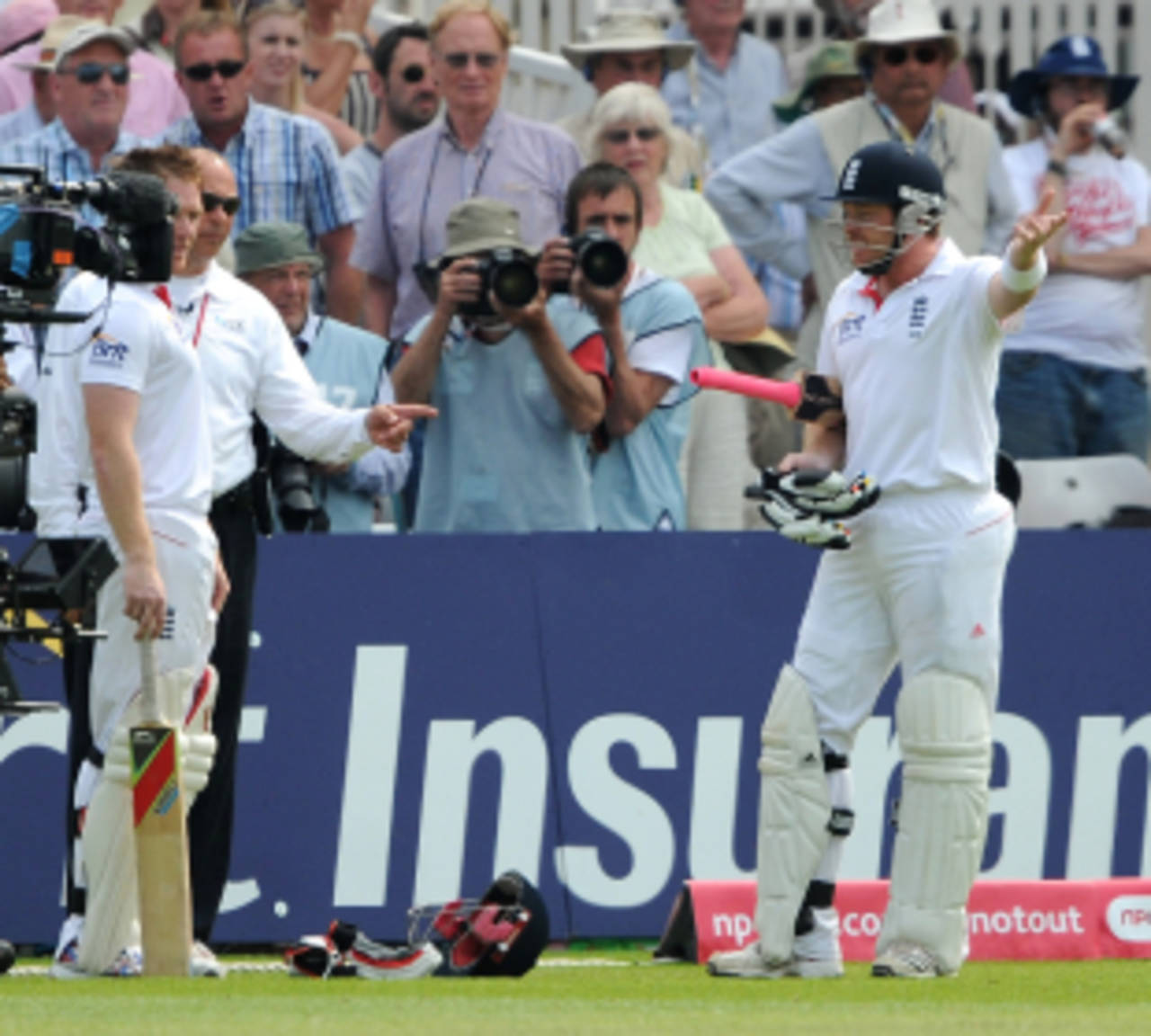It's idiotic to not mankad a straying non-striker
You don't warn a batsman before stumping him, so why warn him before he steals a run?
Ian Chappell
Jun 15, 2014, 2:54 AM

Ian Bell should have been asked to go read the laws of cricket instead of being allowed to bat again after being dismissed by India at Trent Bridge in 2011 • PA Photos
Sri Lanka's captain, Angelo Mathews, was not repentant in the lead-up to the Test at Lord's when discussing the mankad of Jos Buttler in an ODI.
And nor should he be.
How come when the administrators blunder in changing the law, and the batsmen take advantage by cheating, it's the fielding side that is vilified?
Under the old law it was straightforward. If the non-striker backed up correctly (feet outside, bat inside the crease) and didn't leave his ground until the bowler released the ball, he couldn't be mankaded. Anybody who was mankaded under that law deserved his punishment for 1) being stupid, and 2) not putting a high enough value on his wicket.
Then the administrators - in a case of meddling purely for the sake of it - changed the law and in doing so, encouraged batsmen to leave their crease before the ball was released. This change legalised cheating - stupidity at its zenith.
The law has since been changed again but batsmen are now in the habit of gaining an advantage and we can only hope a few more are mankaded so the ploy is discouraged.
Cricket missed a great opportunity to eradicate reckless backing up forever when they failed to clone the fiery Australian legspinner Bill "Tiger" O'Reilly. A young journalist once went to Tiger in the press box. "Excuse me Mr O'Reilly," he asked timidly, "but did you ever mankad a batsman?" O'Reilly looked the whippersnapper up and down, then growled, "Son, I never found a batsman that keen to get to the other end."
If you play by the laws you'll be contesting the game in the right spirit. And how is cheating at the non-striker's end upholding the spirit?
The advantage to the batting side is huge when the non-striker is allowed to get a start. Backing up makes it easier for a batsman and a tailender to collect twos, so the accomplished player retains the strike more often; and the ultimate reward can be victory when extra runs are "thieved" in a tight finish.
I'm surprised more non-strikers haven't been mankaded and that fielding sides bother with the so-called "courtesy" of warning the batsman first.
Do you warn a batsman before you stump him? No. Then why warn him before you mankad him? The situation is exactly the same: the batsman leaves his ground of his choosing and he's aware of the risk involved.
And if anyone, in arguing for the defence, invokes the spirit of cricket, I'm likely to lose my lentils all over the lunch table.
What is more important, the laws of the game or the spirit of cricket? If you play by the laws you'll be contesting the game in the right spirit. And by the way, how is cheating at the non-striker's end upholding the spirit?
For some absurd reason it's the fielding side that is vilified when a batsman acts stupidly. In 2011 at Trent Bridge, when Ian Bell was guilty of gross negligence in walking off the field at tea time - thinking the ball was dead - and MS Dhoni ran him out, it was the Indian captain who was expected to grovel.
Dhoni should have told captain Andrew Strauss and coach Andy Flower, when they came to ask for Bell's reinstatement: "B***** off back to your dressing room and tell Ian to take greater care of his wicket next time. And while he's got some time on his hands, he should read the laws of cricket."
The fielding side wasn't always vilified in these cases. When the West Indies fast bowler Charlie Griffith mankaded Ian Redpath at Adelaide Oval in 1968-69, no Australian player pleaded the batsman's case. And we certainly wouldn't have blamed Wes Hall if he had repeated the dose to the same batsman in the next Test, when Redda was again "discovered" well out of his ground. Redda was lucky Wes had a sense of humour. After glaring at him, Hall chuckled: "You must be some kind of idiot, man."
It's hard not to agree with those sentiments. And any fielding side that doesn't mankad a cheating batsman should be looked upon in the same light. At the very least it would highlight the stupidity of changing a perfectly acceptable law.
Former Australia captain Ian Chappell is now a cricket commentator for Channel 9, and a columnist